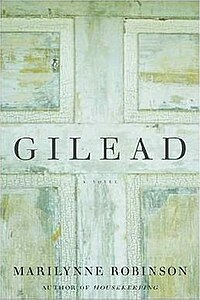This is a curious book. It's not quite like anything else I've read. It's a diary-like book-long letter from a Congregationalist minister to his son. Having married a woman a fair amount younger, he faces the disintegration of his own bodily form while his son is too young to teach the things he would like to teach. Along the way, it is also a way for John Ames the mull through his own past, his failings and successes, his loves and losses.
It's a very meditative book, one that wanders through the past rather than pressing forward through incident after incident. Ames keeps returning to the seminal events in his life - the presence of his riproaring preacher grandfather, his courtship of Lila, his second wife. There are also the events that have ellipses around them for much of the book, things too painful to talk about.
Those last mostly focus around the delinquent son of Ames' best friend, a Presbyterian minister. The son has laid heavily on Ames' conscience, not so much because of his lack of belief as his behaviour. This old, old would rises to the forefront again when the son returns to stay with his family, and Ames must decide whether or not his urge to warn his wife against the man comes from pettiness and jealousy, or genuine concern for her wellbeing.
Religion is taken seriously in this book, and Ames is not going through a crisis of faith. He is not harsh on those who lack faith, but he himself has always believed, and knew from an early age that he would follow in the footsteps of his father and grandfather. There was no rebellious phase here - his older brother took that portfolio on.
Christianity is not the contentious issue, but it is the underlying cloth out of which the story is woven. From a line of ministers, John Ames has found meaning in his life as a minister, which he struggles to figure out how to pass on to his son, when his son is old enough to understand. There is little judgement, much love, and acceptance.
At times, this almost doesn't feel like fiction, although it unequivocally is. The pacing is slow and deliberate, the thoughtful working through of a life lived, taking the kind of digressions that one might expect come to mind as one mulls over what has gone before.
Although the book is primarily and almost exclusively about white people, there is an undertone of race as an issue. Ames' grandfather took up arms to fight for the end of slavery. His father was a pacifist who couldn't find the sense in causing more death. Ames has largely not had to fight in his own life, but an unexpected revelation makes him wonder how those around him would react if they had been told what he was. Wanting to think the best of those close to you, but not sure that faith would be rewarded.
I wouldn't say that this was a book that I loved, but I was always intrigued by it. It was a calming place to sit and put my attention for the days I was reading it. I am looking forward to reading the other two books set in the same town that have come out.

No comments:
Post a Comment